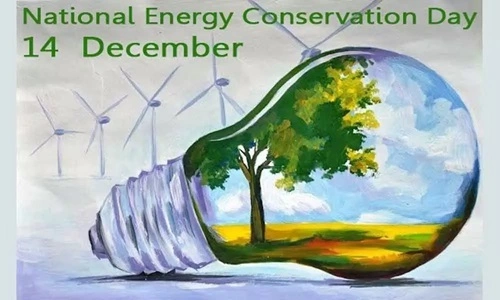Observed annually on December 14th, National Energy Conservation Day in India serves as a crucial reminder of the importance of conserving energy for a sustainable future. Initiated by the Bureau of Energy Efficiency (BEE) under the Ministry of Power, this day aims to spread awareness about efficient energy usage and encourage individuals and organizations to adopt energy-saving practices.
Energy is the backbone of economic growth, industrialization, and development. However, with depleting resources and rising environmental concerns, energy conservation has become a pressing necessity. In this article, we explore the history, significance, celebrations, and the role of individuals and industries in energy conservation in India.
History of National Energy Conservation Day

National Energy Conservation Day was established by the Bureau of Energy Efficiency (BEE) in 2001, following the implementation of the Energy Conservation Act, 2001. The act was introduced to encourage efficient energy management and promote policies that would help reduce energy wastage.
BEE plays a pivotal role in organizing campaigns and initiatives to promote energy conservation across the country. Since its inception, the day has grown in significance, with greater participation from industries, schools, and individuals alike. It reflects India’s commitment to sustainable development and its proactive stance on climate change mitigation.
Significance of National Energy Conservation Day
1. Raising Awareness
The day is a platform to educate the public about the need for energy conservation and the benefits it brings to both the environment and the economy. It emphasizes the importance of adopting energy-efficient technologies and practices in daily life.
2. Combating Climate Change
Energy conservation directly contributes to reducing carbon emissions, thereby combating global warming and climate change. With the world facing an environmental crisis, the significance of conserving energy cannot be overstated.
3. Promoting Sustainable Development
Efficient energy usage ensures the sustainability of resources for future generations. By reducing energy wastage, we can slow down the depletion of natural resources like coal, oil, and natural gas.
4. Reducing Energy Bills
Energy conservation is not only environmentally beneficial but also economically advantageous. It helps individuals, industries, and governments save on energy costs, leading to better resource allocation.
India’s Energy Scenario
India is one of the world’s largest consumers of energy, with a growing demand driven by rapid urbanization, industrialization, and population growth. While renewable energy sources like solar and wind are gaining momentum, a significant portion of India’s energy still comes from non-renewable sources such as coal, petroleum, and natural gas.
Energy Challenges in India
- High dependence on fossil fuels.
- Increasing energy demand due to economic growth.
- Environmental degradation caused by energy production and consumption.
- Limited access to affordable energy in rural areas.
To address these challenges, energy conservation has become a priority for the government and private sectors. Programs like the Ujala Scheme (distribution of LED bulbs) and the promotion of renewable energy through the National Solar Mission are examples of India’s efforts toward energy efficiency.
How Is National Energy Conservation Day Celebrated?
National Energy Conservation Day is celebrated with various events, initiatives, and awareness drives across the country. The celebrations aim to engage people from all walks of life to contribute to the energy conservation movement.
1. National Energy Conservation Awards
One of the key highlights of the day is the National Energy Conservation Awards ceremony, organized by the Ministry of Power. These awards recognize industries, institutions, and individuals for their outstanding contributions to energy efficiency and conservation.
2. Public Awareness Campaigns
Awareness drives are conducted in schools, colleges, and workplaces to educate people about the importance of saving energy. Campaigns include seminars, workshops, and exhibitions showcasing energy-efficient technologies.
3. School and College Programs
Educational institutions organize debates, essay writing competitions, poster-making contests, and street plays to spread the message of energy conservation among students.
4. Social Media Outreach
In the digital age, social media platforms play a significant role in promoting National Energy Conservation Day. Hashtags like #EnergyConservation and #SaveEnergy trend on this day, encouraging people to take small but impactful steps toward saving energy.
5. Pledges and Initiatives
Many organizations and communities take pledges to adopt energy-efficient practices. Offices may implement green policies, and households may commit to using energy wisely.
Energy Conservation Tips for Individuals
Each individual can make a difference by incorporating simple energy-saving habits into their daily lives. Here are some practical tips:
1. Switch to LED Lighting: Replace traditional incandescent bulbs with energy-efficient LED lights. They consume significantly less power and last longer.
2. Unplug Devices: Turn off electronic devices and unplug chargers when not in use. Standby power consumption accounts for unnecessary energy wastage.
3. Use Energy-Efficient Appliances: Opt for appliances with higher BEE star ratings, which indicate better energy efficiency.
4. Optimize Cooling and Heating: Use ceiling fans, set air conditioners to optimal temperatures (24–26°C), and insulate your home to reduce energy consumption.
5. Embrace Renewable Energy: Install solar panels or use solar-powered gadgets wherever possible.
6. Practice Smart Driving: Carpool, use public transport, or switch to electric vehicles to save fuel and reduce emissions.
7. Educate Others: Share energy conservation tips with friends and family to create a ripple effect in society.
Role of Industries in Energy Conservation
Industries are among the largest consumers of energy, and their participation is crucial for achieving significant energy savings. The government has implemented various policies and programs to promote energy efficiency in the industrial sector, such as:
1. PAT Scheme (Perform, Achieve, Trade)
The PAT Scheme, introduced by the Bureau of Energy Efficiency, is a market-based mechanism that encourages large-scale industries to improve their energy efficiency.
2. Energy Audits
Industries conduct regular energy audits to identify areas where energy can be saved. This helps in reducing operational costs and minimizing environmental impact.
3. Green Buildings
The concept of green buildings, which utilize energy-efficient materials and designs, is gaining popularity in India. These buildings consume less energy for heating, cooling, and lighting.
4. Renewable Energy Integration
Many industries are now integrating renewable energy sources like solar and wind into their operations, reducing their carbon footprint and dependence on non-renewable resources.
Government Initiatives for Energy Conservation
The Indian government has launched several initiatives to promote energy conservation and efficiency:
1. UJALA Scheme
Under this scheme, LED bulbs are distributed at subsidized rates to encourage their use in households and industries.
2. Energy Efficiency Financing Platform (EEFP)
This initiative facilitates funding for energy efficiency projects across the country.
3. National Electric Mobility Mission Plan (NEMMP)
Aimed at promoting electric vehicles, this plan seeks to reduce dependence on fossil fuels and encourage cleaner transportation.
4. Standards and Labeling Program
The BEE Star Label helps consumers identify energy-efficient appliances, encouraging them to make informed decisions.
The Future of Energy Conservation in India
As India continues to develop, energy conservation will remain a key priority. The transition to renewable energy, adoption of smart technologies, and active participation of citizens will play a significant role in shaping a sustainable energy future. Initiatives like the International Solar Alliance (ISA) and the government’s commitment to achieving Net Zero Emissions by 2070 highlight India’s proactive approach toward energy conservation.
Conclusion
National Energy Conservation Day serves as a powerful reminder of our collective responsibility toward conserving energy. Whether it’s through small individual actions or large-scale industrial efforts, every step counts in creating a sustainable and energy-efficient future.
This December 14th, let us pledge to adopt energy-saving practices, support renewable energy, and educate others about the importance of conservation. Together, we can ensure that the resources we enjoy today are preserved for generations to come.
“Save Energy Today for a Better Tomorrow!”

